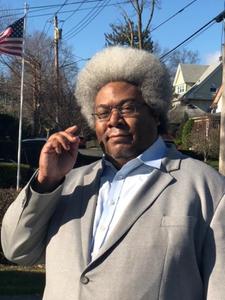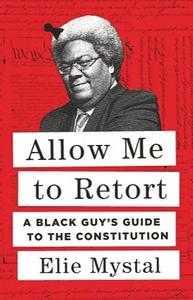 Elie Mystal is the justice correspondent at the Nation magazine, a frequent guest on MSNBC and CNN, and can usually be found playing video games when not demanding justice. His first book, Allow Me to Retort: A Black Guy's Guide to the Constitution (The New Press, March 1, 2022) walks readers through the Constitution and tackles some of the biggest issues in the culture wars.
Elie Mystal is the justice correspondent at the Nation magazine, a frequent guest on MSNBC and CNN, and can usually be found playing video games when not demanding justice. His first book, Allow Me to Retort: A Black Guy's Guide to the Constitution (The New Press, March 1, 2022) walks readers through the Constitution and tackles some of the biggest issues in the culture wars.
On your nightstand now:
The Color of Abolition by Linda Hirshman. Linda writes deep dive histories about social movements, with a real focus on the legal histories. She understands that activists are trying to change laws, not just attitudes.
Favorite book when you were a child:
Return of the King by J.R.R Tolkien. This is the standard answer from a D&D nerd culture kid. What's interesting is that I've picked the last in the series instead of the beginning. I like payoff.
Your top five authors:
James Baldwin: Baldwin explains, more or less, what it's like to be black in America, 1776--present.
Nikole Hannah-Jones: Jones explains, more or less, why it's like this in America, and all the things white folks do to keep it that way.
Plato: To understand the government you have to understand what it's trying to do. And why.
Robert Caro: Caro talks like he's explaining people, but really he's explaining power, and how to use it.
Brandon Sanderson: Okay, he writes fiction but the man understands how to build a world. There's no point in understanding how the government works and why and what it's doing if you don't have the creativity to imagine something better or at least different.
Book you've faked reading:
Pride and Prejudice by Jane Austen. Look, I get it. She's a great author. Yay. I just don't care who's gonna marry Elizabeth. I really don't. I'd rather do math proofs.
Book you're an evangelist for:
The Storm Before The Storm by Mike Duncan. Duncan laid out exactly how the Roman Republic died and turned into a dictatorship and people need to understand it doesn't start with Julius Caesar, it starts with the norm-breaking breakdown of shared values that creates the conditions for a Julius Caesar, and we are on the same path and people need to get it.
 Book you've bought for the cover:
Book you've bought for the cover:
Jurassic Park by Michael Crichton. I was 12 or 13 years old and about to get on a plane, and it had a dinosaur on the cover so I went for it, and boy was I not disappointed.
Book you hid from your parents:
The Art of War by Sun Tzu. My parents were very "anti-war." They literally used to take away the guns from my G.I. Joes before they'd let me play with them. But I thought it was important to know about war so I went straight to the source.
Book that changed your life:
Guns, Germs, and Steel by Jared Diamond. I know some of the science doesn't hold up and some of the arguments are a bit problematic now. But ever since I first got my hands on it, I felt armed to argue with white people that their self-appointed position of primacy in the post-colonial is undeserved and, more importantly, unnecessary.
Favorite line from a book:
"I can't believe what you say because I see what you do." --James Baldwin. I'm cheating a bit because this is one of his essays (From the Nation magazine, where he was a writer, in fact). I don't remember which collection of essays this was in. But it basically sums up my entire coverage of the Supreme Court.
Five books you'll never part with:
Plato's Republic. As discussed, this explains how and why we have society.
Machiavelli's The Prince. And this explains how the people in charge of that society will inevitably abuse their power, and why the people will not stop them.
Sun Tzu: The Art of War. And this explains how to fight those people in power, when the time comes. And, yes, I know that's what all the annoying tech and banker bros say, but it also works for social activism.
Mary Shelley's Frankenstein. From the moment I read this in high school I thought "This lady is describing Republicans," and I have never been wrong about that for a single day.
William Golding's Lord of the Flies. This book also explains Republicans. And white boys with no adult supervision. It's a reminder of how quickly it all falls apart.
Book you most want to read again for the first time:
F. Scott Fitzgerald's The Great Gatsby. I remember thinking that people would read this book and instantly learn that people with money and power were paper tigers and not be so afraid of them. Note, I read this *before* I read The Prince.
Your top three plays:
Who's Afraid of Virginia Woolf: I mean, like, it takes nice sounding but ultimately vapid people and breaks them with pain and vitriol and liquor. It's violent, yet the only weapon is a snapdragon. It's just the best.
Macbeth: Everybody acts like ambition is a good thing and I always want to say "is it though" and then make people read Macbeth. Sometimes, being content with what you have is okay, too.
Fences: Speaking of people who are broken, you have to understand how people come to be who they are.

